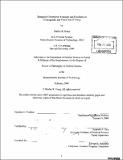| dc.contributor.advisor | Kenneth A. Oye. | en_US |
| dc.contributor.author | Hung, Shirley Kon-Jean | en_US |
| dc.contributor.other | Massachusetts Institute of Technology. Dept. of Political Science. | en_US |
| dc.date.accessioned | 2009-11-06T16:18:54Z | |
| dc.date.available | 2009-11-06T16:18:54Z | |
| dc.date.issued | 2008 | en_US |
| dc.identifier.uri | http://hdl.handle.net/1721.1/49679 | |
| dc.description | Thesis (Ph. D.)--Massachusetts Institute of Technology, Dept. of Political Science, 2008. | en_US |
| dc.description | "February 2008." | en_US |
| dc.description | Includes bibliographical references (p. 235-248). | en_US |
| dc.description.abstract | This main question in this dissertation is under what conditions government agencies show foresight in formulating strategies for managing emerging technologies. A secondary question is when they are capable of adaptation. Conventional wisdom and most organization theory literature suggest that organizations are reactive rather than proactive, reluctant to change, and responsive only to threats to their core mission or autonomy. The technological, economic, social, political, and sometimes security uncertainties that often accompany emerging technologies further complicate decision-making. More generally, organizations must often make decisions under conditions of limited information while guarding against lock-in effects that can constrain future choices. The two cases examined in this dissertation suggest that contrary to conventional wisdom, organizations can show foresight and flexibility in the management of emerging technologies. Key factors that promote foresight are: an organizational focus on technology, with the emerging technology in question being highly relevant to the organization's mission; technical expertise and a recognition of the limits of that knowledge; and experience dealing with other emerging technologies. The NSA recognized the inevitability of mass market encryption early on and adopted a sophisticated strategy of weakening the strength of, reducing the use of, and slowing down the deployment of mass market encryption in order to preserve its ability to easily monitor communications. The Agency showed considerable tactical adaptation in pursuit of this goal. The FCC adopted a rather unusual policy of forbearance toward VoIP. The Commission deliberately refrained from regulating VoIP in order to allow the technology to mature, innovation to occur, uncertainties to resolve, and to avoid potential market distortions due to too early or suboptimally formulated regulation. Eventually, however, pressure from outside interests such as law enforcement forced the Commission to act. | en_US |
| dc.description.statementofresponsibility | by Shirley K. Hung. | en_US |
| dc.format.extent | 248 p. | en_US |
| dc.language.iso | eng | en_US |
| dc.publisher | Massachusetts Institute of Technology | en_US |
| dc.rights | M.I.T. theses are protected by
copyright. They may be viewed from this source for any purpose, but
reproduction or distribution in any format is prohibited without written
permission. See provided URL for inquiries about permission. | en_US |
| dc.rights.uri | http://dspace.mit.edu/handle/1721.1/7582 | en_US |
| dc.subject | Political Science. | en_US |
| dc.title | Managing uncertainty : foresight and flexibility in cryptography and voice over IP policy | en_US |
| dc.title.alternative | Foresight and flexibility in cryptography and voice over IP policy | en_US |
| dc.type | Thesis | en_US |
| dc.description.degree | Ph.D. | en_US |
| dc.contributor.department | Massachusetts Institute of Technology. Department of Political Science | |
| dc.identifier.oclc | 427059231 | en_US |
